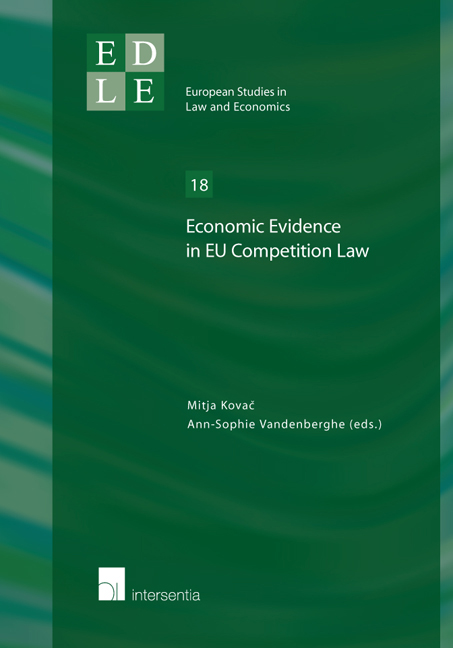Book contents
- Frontmatter
- Dedication
- Preface
- Contents
- List of Contributors
- General Introduction
- PART I ECONOMIC METHODS IN COMPETITION LAW
- PART II ECONOMIC EVIDENCES IN COMPETITION LAW
- PART III INSIDER TRADING, CARTELS AND CRIMINALISATION
- PART IV PRELIMINARY RULINGS AND STATE AID CONTROL
- PART V ECONOMIC EVIDENCE, ENFORCEMENT PROBLEMS AND NATIONAL COURTS
- Chapter 15 Google, Competition Policy and the Owl of Minerva
- Chapter 16 The Interaction between EU Regulatory Implants and the Existing Croatian Legal Order in Competition Law
- Chapter 17 Empiric Assessment of the Role of Economic Analysis in Russian Competition Law
- Chapter 18 Challenges of Private Enforcement of Antitrust in Slovenia
- Chapter 19 On the Need of EU Wide Best Practices in Competition Law Enforcement Proceedings
- Index
Chapter 17 - Empiric Assessment of the Role of Economic Analysis in Russian Competition Law
from PART V - ECONOMIC EVIDENCE, ENFORCEMENT PROBLEMS AND NATIONAL COURTS
Published online by Cambridge University Press: 21 September 2018
- Frontmatter
- Dedication
- Preface
- Contents
- List of Contributors
- General Introduction
- PART I ECONOMIC METHODS IN COMPETITION LAW
- PART II ECONOMIC EVIDENCES IN COMPETITION LAW
- PART III INSIDER TRADING, CARTELS AND CRIMINALISATION
- PART IV PRELIMINARY RULINGS AND STATE AID CONTROL
- PART V ECONOMIC EVIDENCE, ENFORCEMENT PROBLEMS AND NATIONAL COURTS
- Chapter 15 Google, Competition Policy and the Owl of Minerva
- Chapter 16 The Interaction between EU Regulatory Implants and the Existing Croatian Legal Order in Competition Law
- Chapter 17 Empiric Assessment of the Role of Economic Analysis in Russian Competition Law
- Chapter 18 Challenges of Private Enforcement of Antitrust in Slovenia
- Chapter 19 On the Need of EU Wide Best Practices in Competition Law Enforcement Proceedings
- Index
Summary
INTRODUCTION
Antitrust regulation is one of the legal spheres where law enforcement should be based on the principles of economic theory. Thus antimonopoly policy is the meeting point of economics and law. It entails new approaches to antitrust cases for either disciplines or conflicts caused by disagreements on the diverse methods. The main difference between economic and legal approaches is that the former is inclined to be more flexible norms while the latter prefers bright-line rules.
This work, which touches upon the question of whether economic theory could guide antimonopoly policy, studies the element of antimonopoly law enforcement known as an economic analysis of the market. Its logic comes from economic theory. Economic analysis is used to qualify market conditions and market positions of the economic entities. It makes an investigation of each antitrust case more individual and increases its accuracy. It also leads to more flexible antitrust law enforcement because the qualification of the behaviour of economic entities became dependent on the qualification of their market positions and market conditions in general.
The main objective of this chapter is to estimate the role of economic analysis in litigations where companies appeal the decisions of antitrust authorities. Two types of infringes were considered: abuse of dominant position (article 10 of the Federal Law No. 135- FZ “On the Protection of Competition”) and agreements restricting competition (article 11 of the Federal Law No. 135- FZ “On the Protection of Competition”). As it was mentioned above, to qualify the behaviour of economic entities it is necessary to qualify their market positions and market conditions. For this purpose economic analysis is applied according to the special Order “On a process of market competition level analysis” that consists of the following elements:
– time interval
– product market
– geographic market
– composition of market (economic entities)
– market volume and companies’ shares on it
– market concentration level
– entry barriers
– market competition level.
– market competition level.
The chapter estimates the influence of an economic analysis application in litigation on its outcome and its durability and reveals factors that form the demand for economic analysis by antitrust authorities. The study has the following hypotheses.
- Type
- Chapter
- Information
- Economic Evidence in EU Competition Law , pp. 357 - 374Publisher: IntersentiaPrint publication year: 2016



